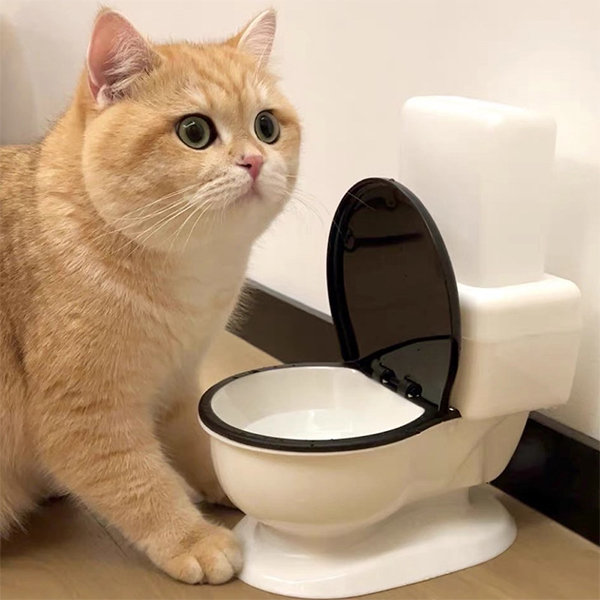The article which follows about Don’t flush cat feces down the toilet is without a doubt entertaining. You should investigate for yourself.

Intro
As cat proprietors, it's important to bear in mind exactly how we take care of our feline close friends' waste. While it may appear practical to purge cat poop down the toilet, this technique can have destructive repercussions for both the setting and human health and wellness.
Ecological Impact
Flushing feline poop introduces harmful pathogens and parasites into the water, positioning a substantial danger to marine environments. These contaminants can negatively influence marine life and compromise water top quality.
Health Risks
In addition to ecological concerns, flushing feline waste can likewise posture health risks to human beings. Feline feces may have Toxoplasma gondii, a parasite that can create toxoplasmosis-- a potentially severe ailment, specifically for expectant females and individuals with damaged body immune systems.
Alternatives to Flushing
The good news is, there are much safer and a lot more accountable means to throw away cat poop. Take into consideration the following alternatives:
1. Scoop and Dispose in Trash
One of the most typical approach of dealing with cat poop is to scoop it into a naturally degradable bag and toss it in the trash. Make certain to use a dedicated trash scoop and get rid of the waste immediately.
2. Use Biodegradable Litter
Go with biodegradable feline clutter made from materials such as corn or wheat. These trashes are environmentally friendly and can be safely dealt with in the garbage.
3. Hide in the Yard
If you have a backyard, consider burying cat waste in an assigned location away from veggie gardens and water sources. Make certain to dig deep sufficient to stop contamination of groundwater.
4. Set Up a Pet Waste Disposal System
Invest in a pet dog waste disposal system especially developed for pet cat waste. These systems use enzymes to break down the waste, minimizing odor and environmental impact.
Conclusion
Accountable family pet possession extends beyond supplying food and shelter-- it likewise involves correct waste monitoring. By refraining from flushing feline poop down the bathroom and choosing alternative disposal methods, we can decrease our environmental footprint and safeguard human health.
Why You Should Never Flush Cat Poop Down the Toilet
A rose by any other name might smell as sweet, but not all poop is created equal. Toilets, and our sewage systems, are designed for human excrement, not animal waste. It might seem like it couldn’t hurt to toss cat feces into the loo, but it’s not a good idea to flush cat poop in the toilet.
First and foremost, assuming your cat uses a litter box, any waste is going to have litter on it. And even the smallest amount of litter can wreak havoc on plumbing.
Over time, small amounts build up, filling up your septic system. Most litter sold today is clumping; it is made from a type of clay that hardens when it gets wet. Ever tried to scrape old clumps from the bottom of a litter box? You know just how cement-hard it can get!
Now imagine just a small clump of that stuck in your pipes. A simple de-clogger like Drano isn’t going to cut it. And that means it’s going to cost you big time to fix it.
Parasitic Contamination
Believe it or not, your healthy kitty may be harboring a nasty parasite. Only cats excrete Toxoplasma in their feces. Yet it rarely causes serious health issues in the cats that are infected. Most people will be fine too if infected. Only pregnant women and people with compromised immune systems are at risk. (If you’ve ever heard how women who are expecting are excused from litter cleaning duty, Toxoplasma is why.)
But other animals may have a problem if infected with the parasite. And human water treatment systems aren’t designed to handle it. As a result, the systems don’t remove the parasite before discharging wastewater into local waterways. Fish, shellfish, and other marine life — otters in particular — are susceptible to toxoplasma. If exposed, most will end up with brain damage and many will die.
Depending on the species of fish, they may end up on someone’s fish hook and, ultimately on someone’s dinner plate. If that someone has a chronic illness, they’re at risk.
Skip the Toilet Training
We know there are folks out there who like to toilet train their cats. And we give them props, it takes a lot of work. But thanks to the toxoplasma, it’s not a good idea.

We had been made aware of that report about Don’t flush cat feces down the toilet through a friend on our other web address. Loved our piece of writing? Please share it. Help others check it out. I am grateful for your time. Kindly check up our blog back soon.
Call Today